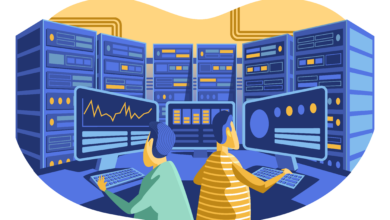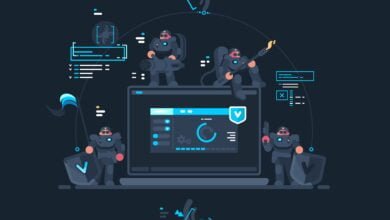Linux
Linux, a powerful and versatile operating system, has left an indelible mark on the world of computing. Linux Servers power most areas of the web.
- Origins and Kernel:
- Linux emerged in 1991 when Linus Torvalds, a Finnish computer science student, released the first version of the Linux kernel.
- The kernel serves as the core component, managing hardware resources, processes, and communication between software and hardware.
- Open Source Philosophy:
- Embodies the spirit of open-source software. Its source code is freely available, allowing developers worldwide to contribute, modify, and distribute it.
- This collaborative approach fosters innovation, security, and transparency.
- Distributions (Distros):
- Linux Servers come in various flavours called distributions or distros. Each distro packages the kernel with additional software, libraries, and utilities.
- Some popular distros include:
- Ubuntu: Known for its user-friendly interface and extensive community support.
- Debian: A stable and versatile distro used as the foundation for many others.
- Fedora: Embraces cutting-edge technologies and serves as a testing ground for Red Hat Enterprise Linux.
- Arch: Appeals to advanced users who prefer a minimalist, do-it-yourself approach.
- Mint: Offers a polished experience with a focus on ease of use.
- Some popular distros include:
- Linux Servers come in various flavours called distributions or distros. Each distro packages the kernel with additional software, libraries, and utilities.
- Command Line and Graphical Interfaces:
- Provides a robust command-line interface (CLI) where users interact with the system using text commands.
- Graphical user interfaces (GUIs) like GNOME, KDE Plasma, and Xfce enhance usability for those who prefer visual interactions.
- Use Cases and Domains:
- Powers virtual servers, dedicated servers, supercomputers, embedded devices, and smartphones (e.g., Android).
- Excel in web hosting, cloud computing, scientific research, and development environments.
- Containers (e.g., Docker) rely heavily on Linux for isolation and scalability.
- Security and Stability:
- Boasts robust security features, including permissions, firewalls, and SELinux.
- Its stability ensures minimal downtime, making it ideal for critical systems.
- Community and Philosophy:
- The community thrives on collaboration, forums, mailing lists, and conferences.
- The GNU General Public License (GPL) governs Linux, emphasizing freedom, sharing, and ethical software practices.
In summary, Linux isn’t just an operating system; it’s a global movement that empowers users, developers, and organizations to build, customize, and innovate in a transparent and inclusive ecosystem.
-

What to do if Maldet reports Malware on your server
Assuming you have configured Maldet to send you notifications of Malware hits. Once you receive an email warning you will…
Read More » -
How to Tar/Untar Files and Folders In Linux. Manage Folders
In Linux from the command line, you can tar-untar, or as most people will know zip and unzip files and…
Read More » -
What is FSCK? And how to perform a Linux Disk Check
What is FSCK? FSCK is the Linux file system checker, it stands for file system consistency check and runs on all…
Read More » -
How to use Telnet to ping ports from the command line
Sometimes you may want to ping an IP and a port in Linux. You can accomplish this by using Telnet…
Read More » -
Configure Additional IPs In CentOS Servers
First2Host uses Failover IP blocks. To use additional IPs in CentOS servers you have to configure the IPs in your…
Read More » -
Install Apache, MySQL and PHP on CentOS 7
Install Apache, MySQL and PHP on CentOS 7 Servers This guide is available in template form to deploy to VPS…
Read More » -

Update CentOS Kernel Dedicated Servers
To update CentOS 7 Kernel in your dedicated server our guide will give you step-by-step instructions. To update the Kernel…
Read More » -

How to install a Cloudflare Origin SSL Certificate – NGINX
An SSL Certificate is vital to encrypt data between you and your clients. SSLs can be complicated things. If they…
Read More » -
How To Search CentOS 7 Log Files
Every server logs certain information to different files and servers running CentOS 7 are no exception. There is a log…
Read More » -
How To Open Port FirewallD and Close Port FirewallD
Like IPtables, FirewallD is a Linux firewall that filters packets of data. FirewallD uses Netfilter but Netfilter might need to…
Read More »




